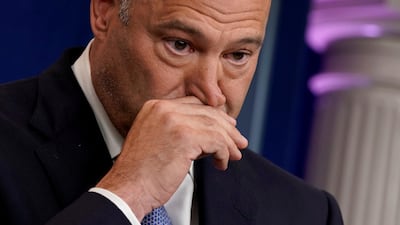Another high-profile figure will soon leave US President Donald Trump's frenzied White House. But unlike some of his controversial former colleagues, competent and well-respected economic adviser Gary Cohn will be mourned by insiders and outsiders alike. Mr Cohn announced his resignation as Mr Trump readies high tariffs on steel and aluminium imports, sparking disquiet in international markets. Mr Cohn was an outsider – a registered Democrat and a globalist in a protectionist Republican administration – so perhaps his resignation was inevitable. It comes days after that of communications director Hope Hicks and fits a recent trend of major departures that has characterised a chaotic administration. Meanwhile Mr Trump himself is fending off a lawsuit related to an extra-marital affair he sought to cover up. We are certainly in uncharted territory. And yet this week the North Koreans have signaled a willingness to surrender their nuclear weapons and meet their southern counterparts, marking the closest sign of rapprochement since fighting ceased in 1953. Mr Trump is bound to take credit where recent presidents have failed. It would not be entirely undeserved.
Developments this week reflect the transactional approach which has given Mr Trump a mixed report card in this region. Naturally, his strategy is not universally applicable. On Iran and Hizbollah, Mr Trump's firm stance has been very welcome, particularly his criticism of the flawed Iran nuclear deal, which retains the backing of other Western leaders, even as Tehran extends its insidious influence in Syria, Iraq, Lebanon and Yemen. After the regime of Bashar Al Assad killed and maimed its own citizens in a chemical attack last April, US missiles struck the Shayrat Airbase at the behest of Mr Trump, who showed himself ready to act where his predecessor Barack Obama would not. Notwithstanding, his ruinous decision last December to move the US embassy to Jerusalem has derailed the remnants of a peace process, particularly given the grim symbolism of relocating in May, when Israelis celebrate and Palestinians mourn the catastrophe of 1948. Because of the far reach of American power, other countries are lining up to follow suit in an effort to placate Mr Trump, including Guatemala and Honduras. Each relocation will do further damage in a volatile neighbourhood. Meanwhile, early action in Syria has given way to empty words of censure.
It is easy from the outside to criticise the mercurial US president, but in the wake of another high-profile resignation a moment of reflection is also required. Mr Trump deserves credit for his firm stance on Iran, and some acclaim for bringing Pyongyang to the table. But it is hard for those in this region to look beyond his intransigence on Jerusalem and to wonder if his one-size-fits-all approach to diplomacy is presidential enough to make real and lasting progress in our increasingly complex world.

